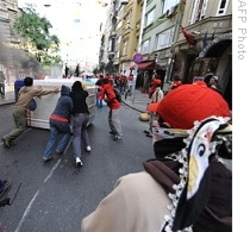Riot police, protesters clash ahead of IMF-World Bank meeting
Turkish police used water cannons and pepper spray on October 6 2009 to disperse protesters demonstrating at the annual International Monetary Fund and World Bank meetings in Istanbul, the Voice of America reported.
Riot police clashed with protesters in a square close to where thousands of finance ministers, central bankers, and economists from around the world are meeting to discuss the global economy. Police followed some protesters as they fled onto nearby streets.
The demonstrators were seen breaking the windows of some banks and shops. Some were seen throwing Molotov cocktails.
Dozens of people were detained during the protests, which were organized by several Turkish unions.

Last week, a student was detained after throwing a shoe at International Monetary Fund Director Dominique Strauss-Kahn during an appearance at an Istanbul university. The shoe missed the IMF leader.
A day earlier, Voice of America reported from Istanbul that doonors to the World Bank say the organization needs to become more efficient in using its resources and give more say to developing economies. The bank and its sister institution, the International Monetary Fund, are holding their annual meetings this year in Istanbul, Turkey, where the discussion has focused on internal reforms as well as the fragile recovery from the global financial meltdown.
The head of the IMF and World Bank development committee Augustin Carstens made a stark announcement at a news conference Monday on the growing impact of the world economic crisis on developing countries.
"The World Bank estimates that by the end of 2010 some 90 million more people risk being forced into extreme poverty," Carstens said.
The Washington-based bank loans money and makes grants to developing and poor countries to pay for investment in education, health care, infrastructure, agriculture and natural resource management, but demand is growing and the bank says it will face serious constraints in the middle of next year.
World Bank chief Robert Zoellick made an appeal to the leaders of the developed world that his bank will need significantly more funding to help less developed economies as the world economic crisis continues to loom.
"We'll likely have another record level of lending - $40 billion or plus this year on top of the $33 billion last year - and while we are in a [relatively good] position ... now ... as we get toward of middle next year [we] are going to face some serious constraints and we would have to ration and focus on the lowest income countries," Zoellick said.
Zoellick says despite the urgent need for more funding, there is strong resistance from some of the main donor countries, including the United States, Great Britain and France, who are demanding reforms in exchange for any more cash.
Among the reforms is increased transparency in the way the bank does business.
While Zoellick said he agrees there is a need for more transparency, he says the reforms will take time - something that the world's poorest nations don't have.
The IMF fosters global monetary cooperation to facilitate international trade, and has bailed out a number of cash-strapped governments that ran into trouble during the ongoing world financial crisis.
While the fund acknowledged the worst of the crisis maybe over, IMF chief Dominic Strass Kahn said difficulties still lie ahead, especially next year.
"Its [the] beginning of the recovery ... still we know its very fragile, both because unemployment is lagging behind and for many countries it will take 10 to 12 months, to have unemployment decreasing and it can be worse for some low income economies. So there is no way to say the crisis is over," Kahn said.
The development committee also announced that an agreement had been reached on the first step to redistributing power in the World Bank in favor of emerging markets.
Zoellick has called for an increase in the share of developing countries in the institution to 50 percent over time. The three percent increase proposed by G-20 leaders last month when they met in Pittsburgh would create a 47 percent share for those countries, he said.
According to observers there has been stiff resistance from some developed countries over not wanting to give up power. But both Zoellick the IMF's Kahn argue the world economic crisis has changed the global economy for good and one of those changes is the increasing importance of the emerging economies in the world marketplace.




